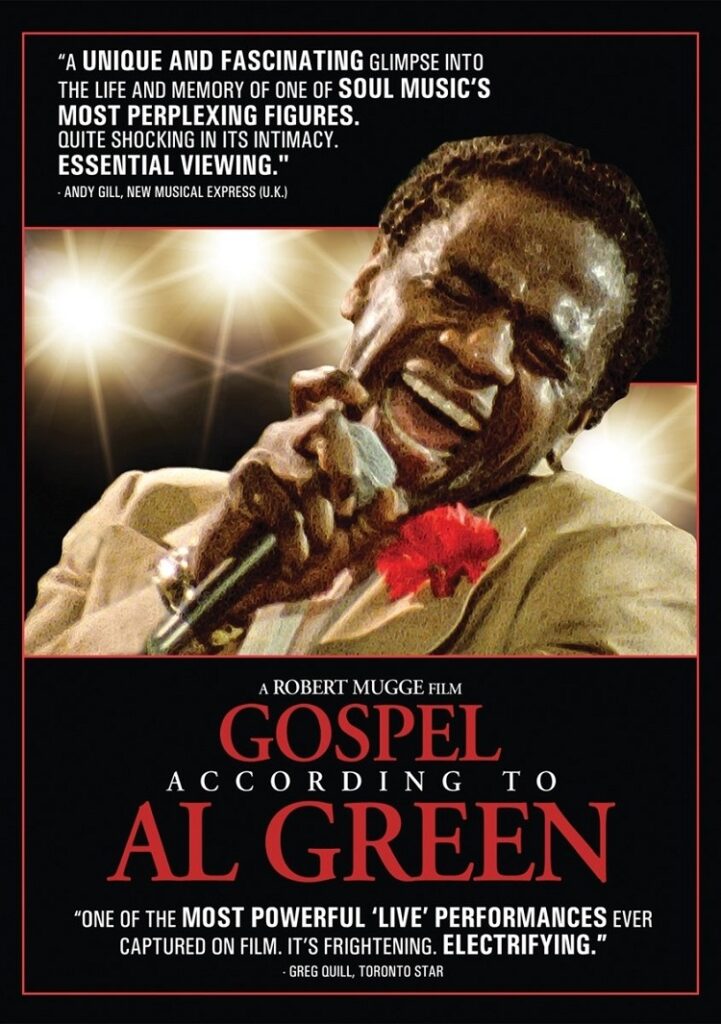
In 1977, R&B legend Al Green signaled to fans that he was undergoing a life—and career—transformation. “Belle,” a track off his LP The Belle Album, contains a telling lyric: “It’s you that I want, but it’s Him that I need.” Green’s struggle to reconcile the spiritual and sensual, the sacred and profane, is chronicled in the newly reissued 1984 documentary Gospel According to Al Green. Originally produced for the BBC, this Robert Mugge-directed film has been remastered for DVD and Blu-ray, and features extras such as updated director commentary, previously unaired outtakes, and the full audio of Mugge’s two-hour interview with Green. The extras enhance an already gripping portrayal of an artist at the top of his game choosing to walk away and follow a different (and often challenging) path.
Gospel According to Al Green includes three segments: an interview with Green in a recording studio; a performance at the Non-commissioned Officers Club of Bolling Air Force Base in Washington, D.C.; and the Seventh Anniversary Celebration of Green’s Full Gospel Tabernacle. In addition, Green and his touring band stage a rehearsal at a studio, with Green agreeing to perform part of “Let’s Stay Together”—a rarity at the time, since he had largely abandoned his hits to focus on religious material. Mugge, a veteran documentarian who had previously helmed films chronicling Sun Ra and Gil Scott-Heron, lets Green tell his own story through music and surprisingly candid moments. One of the most dramatic parts of the film concerns a tragic incident in Green’s life: one that convinced him to leave the rock world. As Green emotionally recounts the event, in 1974 a girlfriend visited him at his Memphis home. She admitted that she was already married, but was deeply in love with Green. Not ready to make such a commitment, Green left her alone to go to bed. At some point in the evening, the woman cooked up a pot of grits, threw the boiling food onto Green’s body, found his .38 revolver in the house, and killed herself. That moment, along with a religious experience a year before, persuaded him to forgo his pop career.
As evident in Green’s Washington, D.C. concert, however, this split proved difficult. While the audience cheers Green and his tight touring band, they clearly wan him to perform “Let’s Stay Together” or “Still in Love wth You.” His passionate renditions of “Amazing Grace” and “Pass Me Not” may oddly rank as the sexiest versions ever recorded, while his take on “People Get Ready” strays significantly from the Impressions version, hovering between the religious and secular.
The climactic moment of the film occurs during the anniversary celebration at Green’s Full Gospel Tabernacle. Drenched with sweat, Green preaches and leads the congregation in song. While it presents a rarely seen glimpse of the singer in church, it also proves that he was still a compelling performer. During his interview, he reveals that he took what he learned from his rock career—namely showmanship—and applied it to his spiritual one. Indeed, the service rivals a rock concert in his electrifying performance and its profound effect on the congregation. At one point, Green looks ready to collapse from exhaustion, chugging a huge glass of orange juice or Gatorade hidden under the lectern before continuing. The scene demonstrates that Green appeared intent on merging both his careers—a process he struggled with for many years.
Years after Gospel According to Al Green was released, he finally decided to return to secular music at least part time. But the documentary portrays Green at an earlier point, when he told longtime producer Willie Mitchell he could no longer sing gospel and pop. Mitchell clearly missed their highly successful collaborative years; as he sits at his desk listening to their old songs, he wears an expression of heartbreak.
Those emotionally candid moments, along with Green’s powerful voice and showmanship, make Gospel According to Al Green a must-watch for hardcore fans as well as general R&B enthusiasts. By 1984, Green was ready to admit to his faults, but was determined to forge a new path. Mugge’s decision to let Green describe his journey through words and song results in one of the more compelling music documentaries ever filmed.